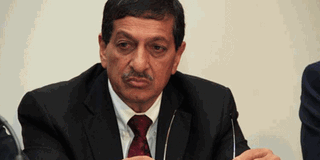CBK insists key depositors at Imperial will be refunded next month

Imperial Bank Chairman Alnashir Popat during the bank's shareholders' press briefing on January 12, 2015. PHOTO | DIANA NGILA | NATION MEDIA GROUP
What you need to know:
- Earlier this month, shareholders of the troubled bank went to court seeking orders to stop further payouts to depositors in order to protect the lender's assets and facilitate recovery.
- “We are open to discussions with the shareholders but we will only re-open to stay open, we are not in the business of opening temporarily then closing,” he said.
- The regulator says they have paid out Sh6.4 billion to 16,955 small and huge depositors who came forward after CBK decided to pay Sh1 million or less through the Kenya Commercial Bank (KCB) and Diamond Trust Bank (DTB) in December last year.
The Central Bank of Kenya (CBK) will push to avail large depositors at the troubled Imperial Bank Limited with access to their funds by end of next month despite efforts by shareholders to stop it.
CBK Governor Dr Patrick Njoroge told the National Assembly Committee on Finance that detailed examination of loans and deposits of more than Sh1 million will be completed by March 31 to allow genuine ones access their funds.
“We are looking at the details whether Know Your Customer was done, whether the loans have security and not just on paper and hopefully we will complete by March,” he said.
The regulator says they have paid out Sh6.4 billion to 16,955 small and huge depositors who came forward after CBK decided to pay Sh1 million or less through the Kenya Commercial Bank (KCB) and Diamond Trust Bank (DTB) in December last year.
CBK has turned down 900 claims and returned 1,200 others to the depositors seeking further proof.
Earlier this month, shareholders of the troubled bank went to court seeking orders to stop further payouts to depositors in order to protect the lender's assets and facilitate recovery.
The shareholders want to protect their key assets which they argue are the large deposits to keep the money in the bank for at least three years while it stabilizes.
Dr Njoroge says he is not willing to re-open the bank just to end up closing it a few months down the line.
“We are open to discussions with the shareholders but we will only re-open to stay open, we are not in the business of opening temporarily then closing,” he said.
The fate of over Sh80 billions in loans, deposits and assets hangs in the balance leaving several organisations exposed with their money stuck in the troubled bank for four months since Imperial Bank was put under receivership in October 13, last year.
Fund managers and banks which had invested Sh2 billion in a bond when Imperial Bank was fundraising may only get 5per cent return on their five year investment.
FORTUNES TIED
One of the Kenya’s biggest bread maker Kenblest which owns 12.5 per cent of Imperial Securities has seen its fortunes tied to the troubled bank.
The Kenya Tea Development Agency (KTDA) had Sh2.3 billion at the time of its closure, putting tea growers in the list of big losers with the bank’s collapse.
The KTDA’s cash is expected to have been held in a fixed deposit account to earn the tea agency interest income, one of the revenue streams that complement its earnings from tea sales every year.
Center for Justice and Environmental Action (CJEA), Mombasa as well as Sunrise of Africa School in Kitengela had money in Imperial Bank.
The Insurance Regulatory Authority (IRA) has disclosed that insurance firms had a total of Sh1.5 billion in the ill-fated lender.
Some of Kenya’s big banks say they had limited exposure to Imperial Bank with Equity and Diamond Trust stating that they had no money banked at the bank while CFC Stanbic has said it had no material exposure.
KCB said it had an immaterial exposure of less than Sh200m which was in the fallen financial institution.
“Imperial's local interbank borrowings stood at Sh1.3 billion which equates to 2 per cent of system wide interbank assets while exposures through letters of credit, guarantees, totalled Sh7.4 billion or just 1 per cent of the total system's off-balance sheet commitments,” Standard Bank Group (SBG) analysts said in a note to investors.
Some Catholic churches in Mombasa may have found themselves exposed to the bank, which had a strong presence in the coastal region.





